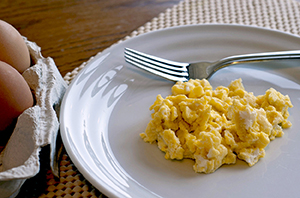Low-Fiber Diet
 |
| Eggs are high in protein and easy to digest. |
Eating a low-fiber diet means eating foods that don’t have much fiber. These foods are easy to digest.
Most of the fiber that you eat passes undigested through your bowel. This is what forms stool. Low-fiber foods can help to slow down your bowel movements. When you eat a low-fiber diet, you have fewer stools. This lets your intestine rest.
Your healthcare provider will tell you how long you need to be on this diet. It may only be for a short time. Low-fiber foods often don’t give you all the nutrients you need to stay healthy. Your healthcare provider may have you take certain vitamins while you are on this diet.
Reasons to eat a low-fiber diet
The goal of a low-fiber diet is to limit the size and number of your stools. It may be prescribed if you:
-
Are going through chemotherapy or radiation treatments
-
Have had intestinal surgery
-
Have trouble digesting food
-
Have a condition that affects your intestine, such as irritable bowel syndrome, Crohn’s disease, ulcerative colitis, or diverticulitis
General guidelines for a low-fiber diet
In general, a low-fiber diet means having fewer than 13 grams of fiber a day. Your healthcare provider may give you a list of things you can and can’t eat or drink. Read food labels. Choose foods and drinks that have as close to zero grams of fiber as possible. Here are general guidelines to follow:
Breads, pasta, cereal, rice, and other starches (6 to 11 servings daily)
-
What to choose: white bread, biscuits, muffins, and white rolls; plain crackers; waffles; white pasta; white rice; cream of wheat; grits; white pancakes; corn flakes; cooked potatoes without skin; pretzels. Fiber content of these foods should be less than 0.5 (½) gram per serving.
-
What to pass up: whole-wheat or whole-grain breads, crackers, and pasta; breads with seeds or nuts; wheat germ; graham crackers; cornbread; wild or brown rice; cereals with whole-grain, bran, and granola; cereals with seeds, nuts, coconut, or dried fruit; potatoes with skin
Milk and dairy (2 servings daily)
-
What to choose: milk and buttermilk; yogurt or ice cream without seeds or nuts; custard or pudding; sour cream; cheese and cottage cheese; cream sauces, soups, and casseroles
-
What to pass up: ice cream and yogurt with seeds, nuts, or fruit chunks
Fruit (2 to 4 servings daily)
-
What to choose: ripe banana; ripe nectarine, peach, apricot, papaya, and plum; soft honeydew melon and cantaloupe; cooked or canned fruit without skin or seeds (not sweetened with sorbitol); applesauce; strained fruit juice (without pulp)
-
What to pass up: raw or dried fruit; all berries; raisins; canned and raw pineapple; prunes and prune juice; fruit juice with pulp
Vegetables (3 to 5 servings daily)
-
What to choose: well-cooked or canned vegetables without seeds, such as spinach, eggplant, green and wax beans, carrots, yellow squash, and pumpkin; lettuce on a sandwich
-
What to pass up: all raw or steamed vegetables; vegetables with seeds, such as unstrained tomato sauce; green peas; lima beans; broccoli; corn; parsnips
Meats and protein (4 to 6 ounces daily)
-
What to choose: tender, well-cooked meat, including ground meat, poultry, and fish; eggs; tofu; creamy peanut butter
-
What to pass up: processed meats such as hot dogs and sausages, tough, chewy meat with gristle; peas, including split, yellow, and black-eyed; beans, including navy, lima, black, garbanzo, soy, pinto, and lentil; peanuts and crunchy peanut butter
Fats, oils, sauces, and condiments (fewer than 8 teaspoons daily)
-
What to choose: butter, margarine, oils, whipped cream, sour cream, mayonnaise, smooth dressings and sauces; plain gravy; smooth condiments
-
What to pass up: dressing with seeds or fruit chunks; pickles and relishes
Other foods and drinks
-
What to choose: water; plain gelatin; plain puddings; pretzels; plain cookies and cakes; honey, syrup; decaffeinated drinks, including tea and coffee
-
What to pass up: popcorn; potato chips; spicy foods; fried, greasy foods; alcohol (ask your healthcare provider); marmalade, jam, and preserves; desserts that have seeds, nuts, coconut, dried fruit, whole grains, or bran; candy that has seeds or nuts; drinks sweetened with sorbitol or other sugar substitutes; caffeinated drinks, including tea, coffee, soda, and energy drinks
Online Medical Reviewer:
Brittany Poulson MDA RDN CD CDE
Online Medical Reviewer:
Diane Horowitz MD
Online Medical Reviewer:
Heather M Trevino BSN RNC
Date Last Reviewed:
12/1/2022
© 2000-2025 The StayWell Company, LLC. All rights reserved. This information is not intended as a substitute for professional medical care. Always follow your healthcare professional's instructions.